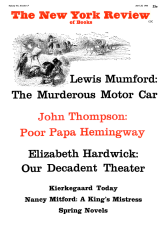In response to:
Cancer Country from the February 17, 1966 issue
To the Editors:
The conclusion is attributed to Dr. Eysenck [NYR, Jan. 17] on the basis of surveys, that “the relation between extraversion and cigarette smoking was stronger in those who smoked heavily than in the light smokers and the ex-smokers.” A restatement with, I hope, a minimum of distortion follows: extraversion is found more frequently to be a characteristic of heavy smokers than of light smokers or ex-smokers.
May I quote an apparently discrepant conclusion by Dr. David M. Kissen: “Extraversion and concealment, two other personality features with which lung cancer may be associated [as distinct from poor outlet for emotional discharge] showed no suggestive relationship with exposure to cigarette smoke” (Brit. J. Med. Pyschol., 1964, 37, 203, ital. added). This is, of course, from a different and not “large” survey; Dr. Kissen’s notes, however, refer to four titles by Dr. Eysenck, including one in collaboration with Dr. Kissen. (Both “quantity smoked, and inhaling habits” were taken into account in the study quoted.)
The care with which Dr. Kissen explains his methodology and the non-exclusiveness of his framework of complementary causes, lead me to think that study of personality factors in lung cancer will not be likely to discredit the evidence against cigarettes. One would expect that the sort of clarification of “control” data which is involved would help to achieve a functional description of the roles of the causes of the disease, and the latter description still seems to be lacking in the “case against smoking.” I cite the Kissen research because it seems to me to be exempt from the criticism which Dr. Lewis directs against Dr. Eysenck’s book in the same field of study.
Stuart Filler
Pontiac, Michigan
This Issue
April 28, 1966



